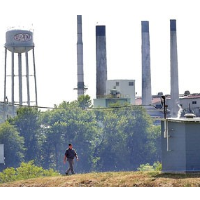DuPont Found Liable for Woman’s Kidney Cancer
 DuPont’s Parkersburg plant (photo: Marietta Times via AP)
DuPont’s Parkersburg plant (photo: Marietta Times via AP)
In the first of what is likely to be many such cases, a woman suffering from kidney cancer won a $1.6 million judgement from DuPont for dumping into the local water supply the chemical that caused her disease.
DuPont used the chemical C8, or perfluorooctanoic acid, in the manufacture of Teflon in its plant in Parkersburg, W.Va. Despite being warned by 3M, the manufacturer of C8, to dispose of the chemical in lined landfills or by incineration, DuPont saved money by dumping the toxic compound into the Ohio River. The company knew C8 was permeating into the area’s water supply, even having local employees bring their tap water to the plant to be tested and finding elevated levels of the chemical in the samples.
Carla Bartlett lived across the river in Coolville, Ohio. She was found to have kidney cancer in 1997, necessitating painful and disfiguring surgery. She sued DuPont, claiming that the elevated level of C8 in her bloodstream caused the cancer.
It was revealed at trial that DuPont knew of the potential toxicity of C8 since the 1950s. It has previously been disclosed that the company was also aware of a high incidence of birth defects in its employees’ children since 1981.
DuPont did dispose of C8 waste properly in Japan, China and the Netherlands, but chose not to at the Parkersburg plant. “The only reason they didn’t do it was because they wanted to save money,” plaintiff’s attorney Mike Papantonio told the jury, according to The Intercept. Later, he added: “We wouldn’t be here today if it were incinerated.”
Even DuPont’s defense witnesses presented damning testimony. One employee, Anthony Playtis, ironically the former occupational health coordinator at the Parkersburg plant, admitted he had 400 parts per billion of C8 in his blood, about 100 times the national average. “I knew there were a lot of other people who had much higher levels, and so I didn’t think mine was anything to worry about,” he said. Playtis added, “Everything is toxic.” Another former employee admitted during cross-examination that he had a possibly cancerous spot on his kidney.
DuPont, perhaps sensing it might be found liable for C8 dumping, spun off its Teflon business to a new company, Chemours, which will also assume some of the liability for the damage done by the chemical.
Chemours and DuPont face about 3,500 other suits from Ohio and West Virginia plaintiffs claiming C8 exposure as the cause of injuries and deaths. The companies chose Bartlett’s suit to be tried first as one it thought it had a good chance of winning, given their view that her condition appeared less severe than that of other plaintiffs.
DuPont promised to appeal the verdict and released a statement saying that “safety and environmental stewardship are core values at DuPont.”
Papantonio also brought some of the first suits in asbestos liability cases. “This is starting out just like those cases,” he told The Intercept. “If I was in charge of this company, I’d be worried.”
-Steve Straehley
To Learn More:
DuPont Found Liable in Teflon Toxin Trial (by Sharon Lerner, The Intercept)
DuPont Found Liable in West Virginia Toxic Water Lawsuit (by Denise Trowbridge and Tiffany Kary, Bloomberg)
U.S. and Kansas Sue DuPont for Poisoning Water and Soil (by Noel Brinkerhoff, AllGov)
DuPont Sued for Covering up 25 Years of Polluting Ohio River (by Noel Brinkerhoff, AllGov)
- Top Stories
- Unusual News
- Where is the Money Going?
- Controversies
- U.S. and the World
- Appointments and Resignations
- Latest News
- Trump Orders ICE and Border Patrol to Kill More Protestors
- Trump Renames National Football League National Trump League
- Trump to Stop Deportations If…
- Trump Denounces World Series
- What If China Invaded the United States?






Comments